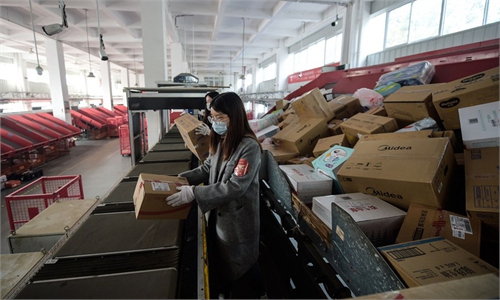
People select food at a supermarket in Xixiu District of Anshun, Southwest China's Guizhou Province. File Photo: Xinhua
"Seizing money from the rich to help the poor" can only produce the outcome of "common poverty" instead of common prosperity, Liu Shijin, deputy director of the Economic Committee of the National Committee of the Chinese People's Political Consultative Conference (CPPCC), said in a media interview during the two sessions in Beijing.
Common prosperity has become a hot topic of discussion as China has set a clear target that by 2035, all people in China will achieve more obvious and substantial progress toward the common prosperity.
According to Liu, to promote common prosperity, it is necessary to reform the distribution system. In addition to the individual income distribution and redistribution through taxes and transfers, there are also social resources and wealth distribution through charitable public welfare methods such as fundraising, donations and funding, he said.
However, he emphasized that social resources and wealth distribution must adhere to the principle of being voluntary, and cannot involve "seizing money from the rich to help the poor."
Doing so will dampen the enthusiasm of some people who have become rich through their own businesses while, for the low-income class, it is still impossible to get rich in the long run via this method, and the final outcome can only be "common poverty," according to Liu.
During more than 40 years of China's reform and opening-up, some people got rich first, but in the process of getting rich, they did indeed drive economic growth, the top economic adviser further noted.
Although the income gap between groups has widened in the process, this widening is also conducive to the improvement of productivity to a certain extent, and "makes the cake bigger," he said.
The most important thing is to help low-income groups, that is, groups currently below the standard of the middle-income group, to improve their human capital and enhance their ability to make a bigger cake, Liu said.
Liu's comment came in tandem with a previous statement by another government official on common prosperity.
Common prosperity is not "lying flat," and Chinese people must avoid falling into the trap of "welfarism," Ha Zengyou, an official of the National Development and Reform Commission, said at a press conference on February 17.
"To achieve the goal of the common prosperity, we must first make the cake bigger and better through joint efforts. Only with everyone's participation and efforts can we truly ensure that everyone can enjoy it," Ha added.


